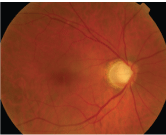 Q: I have a patient whose dermatologist has prescribed a steroid cream for use on the face and eyelids. Should I be concerned about a possible steroid-related IOP response?
Q: I have a patient whose dermatologist has prescribed a steroid cream for use on the face and eyelids. Should I be concerned about a possible steroid-related IOP response?
A: Secondary ocular hypertension from a steroid eyelid cream is unlikely, but it can happen, says Randall Thomas, O.D., of
In the meantime, call or write to the dermatologist who prescribed the ointment and explain the problem, he says. If a steroid ointment is needed in the future, consider fluorometholone ophthalmic ointment, which is not as likely as dexamethasone ointment to raise intraocular pressure.
A patient who used a steroid cream had a rise in IOP and advanced cupping.

Q: I have a patient with age-related macular degeneration (AMD) who said his retina specialist wants to do a series of Avastin injections in his eye over the next six months. What should I tell him?
A: The O.D. can play an important role in letting the patient know what to expect, says Mark Dunbar, O.D., director of optometric services at the Bascom Palmer Eye Institute in
Besides patient education, comanagement involves monitoring vision during the treatment process. Also, If you have access to retinal imaging and you identify a patient who has a recurrence of macular edema or leakage, you can play a role in getting that patient back to the retina specialist sooner, Dr. Dunbar says.
Q: A Medicaid patient presented to my office with papilledema. How should I handle this?
Papilledema is a medical emergency, says Kelly Malloy, O.D., director of the Neuro-Ophthalmic Disease Clinical Specialty Service at Pennsylvania College of Optometry at
Call the hospital and ask for the chief neurology resident or the neurologist on call. Be sure you are dealing with a hospital that has a neurology department on staff.
Then, speak with that doctor personally. Dont delegate this to a staff member, Dr. Malloy says. Whenever you send a patient to the hospital, be sure to give him or her a letter explaining everything that you noted and whom you spoke with at the hospital, because the patient may not initially see the person with whom you spoke on the phone. A letter that the patient has in hand helps avoid confusion.
Q: I have patients with hearing loss. Do I just raise my voice, or are there other techniques?
Besides speaking loud and clear, there are other simple ways to improve communication, says Alan French, O.D., of
Deepen your voice. Most hearing loss is in the higher frequencies, Dr. French says.
Speak in the good ear.
Give the patient time to process what you just said.
Reduce background noise.
For a patient with suspected hearing loss, suggest that the patient get a physical by his or her primary-care doctor, and follow up with a referral letter. If the patient just had a physical, refer him or her directly to an audiologist. Remember that audiologists also see a lot of patients with vision problems, so they could be a good source of referrals.

